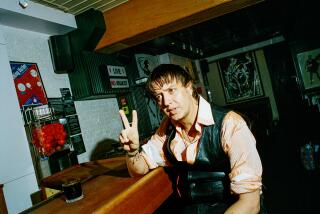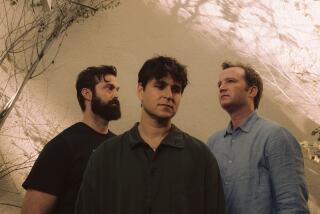Party out of bounds
- Share via
Listen up, party people: Kele Okereke is here to set you straight.
It’s not that the English musician minds people having a good time. His London-based band, Bloc Party, is named for a neighborhood bash, and last week the singer-guitarist and his three bandmates charged up two capacity crowds at the Wiltern with their cerebral but celebratory rock. But it’s the way that partying fits into lives of increasingly noisy desperation that has preoccupied him lately -- so much so that he wrote Bloc Party’s new album, “A Weekend in the City,” entirely on the theme. A unified series of interwoven vignettes, “Weekend” resoundingly reaffirms that the endangered rock-album form still has its uses.
But Okereke, 25, seems more interested in saving a generation than preserving a recording configuration.
“When we were coming back from tour, I was seeing my friends who were just finishing university and were doing these mind-numbing jobs and were literally living for that moment on the weekend when they could go out and get completely messed up, and that was what their fun was,” Okereke said last week.
“Of course that isn’t the way it should be, but there’s no real dissenting voice, there’s no criticism about that anymore. It’s like, ‘This is what life is now,’ and no one makes records talking about this, and if you do so it makes you appear over-earnest or something,” he said. “But I think it is an incredibly important moral issue.”
Sitting in the restaurant of his West Hollywood hotel the afternoon after the first Wiltern concert, the bespectacled singer looked more like a bookish intellectual than a wiry rock frontman. And in fact, he cites his voluminous reading -- including Bret Easton Ellis’ “Less Than Zero,” Michel Houellebecq’s “The Possibility of an Island,” social criticisms by French Situationists Guy Debord and Henri Lefebvre -- as galvanizing inspirations for his own foray into the field.
“It was trying to paint a picture of modern life,” he said of the album. “All of these activities are not producing any enlightenment but more alienation and disillusionment.... It’s not about quality, it’s about quantity. It’s about always seeking the new thing, be it the next pair of shoes or the new sexual partner. It’s not about depth. I think it’s frightening.”
Okereke, who writes all of Bloc Party’s lyrics and melodies, accumulates powerful detail in his depiction of a class haunted by missed opportunities and unfulfilled promise -- people who “cling to bottles and memories of the past.”
“The Prayer” captures the elation and escape offered by the dance floor in its euphoric chorus: “Tonight make me unstoppable / And I will charm, I will slice, I will dazzle them with my wit.” In “On,” a drug high achieves a similar effect, followed by “a flatness bleaker than the one it replaced.” The one moment of solace is a fleeting flash of intimacy between lovers waking to a Sunday morning hangover.
What’s lost, said Okereke, is “the possibility that you’ll experience something, that you’ll do something in life that is actually fulfilling.... Life isn’t fulfilling because there is no voice, or you have a voice but it’s not heard.
“You feel that your opinions aren’t valid, you’ve got no influence in the world. So what do you do? You shirk away from it. Your life becomes essentially quite narcissistic,” he said. “That’s what’s happening in the U.K. That’s why no young people vote anymore. Because they feel that world is completely outside of their influence.... There’s no engagement with what’s happening in society.”
The nature of the album might represent a risk for the band, which formed in 2002 and was at the forefront of the 2005 British rock resurgence. Its debut album, “Silent Alarm,” was named album of the year by the British weekly NME, and the team of Okereke, drummer Matt Tong, guitarist Russell Lissack and bassist Gordon Moakes has remained one of British music’s most admired and popular forces.
“Weekend” drew mixed reviews when it came out last month, and it figures to challenge fans’ willingness to engage its concepts and embrace a new musical direction. The big, full sound and the arrival of some electronic and orchestral textures take it far from the frenetic, jagged landscape of “Silent Alarm.”
“A lot of the songs on ‘Silent Alarm’ came while we were on the dance floors, going to clubs and doing that sort of thing,” said Okereke, whose Nigerian parents immigrated to England before he was born in Liverpool. “But since we became a successful band I haven’t really done that. The way I listen to music now is in my bunk with my iPod or at home when I’m doing the dishes. It’s a very personal thing, and the role music plays in my life is a lot more personal; it’s a lot more of an enveloping thing.
“And I think that’s probably why the record is this way. The things that really resonated with me were very atmospheric, sprawling kinds of dark music. Contemporary classical music, not new, edgy bands.... Composers like Philip Glass and Arvo Part. [Krzysztof] Penderecki -- I literally was obsessed with him. That kind of fed into how I wanted to make the record. Dark and multivocal rather than acoustic guitars.... I think it’s quite cold. The tone of the lyrics is quite angry and it is quite bleak in places, and I think the music suited that.
“That’s something we’ve always done.... We make music that sounds dark.... We probably find it hard to do anything else.”
More to Read
The biggest entertainment stories
Get our big stories about Hollywood, film, television, music, arts, culture and more right in your inbox as soon as they publish.
You may occasionally receive promotional content from the Los Angeles Times.










